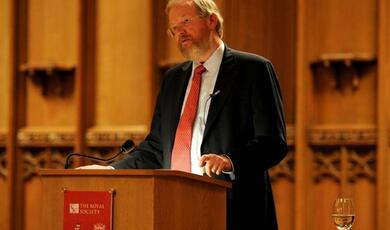A Swift Survey of Fundamentalism: 'The Fundamentalist Mentality'
Share
- Details
- Text
- Audio
- Downloads
- Extra Reading
Download Text
10 November 2010 The Fundamentalist Mentality William Joseph I originally set out to develop the idea of The Fundamentalist Mentality but I quickly realized that it could as well be entitled, The Fundamentalist Mentality in Us All. There are fundamentalist assumptions and principals behind so many of the things you and I do but we don't recognise them. I don't imply that this is always a bad thing and I hope to expose some of these tendencies. Our first association when we hear the word fundamentalism is probably the religious flavour. That is certainly the one in the news today with tragic effect. The motive behind religious fundamentalism is logical. If God has revealed things to us, we would be fools to ignore or question them. That may be a conditional sentence but it is also a valid principal. Religious fundamentalism is not limited to that principle. People of faith are usually those who sense something transcendent in human life. It can be compared to having a sense which recognises beauty or elegance. Some have this sense more keenly than others but it is not to be dismissed. The physicist energetically pursues the question, Why is there something and not nothing? To one degree or another, all of us ask it and a creative God can certainly be an answer. The next logical question is, What is my place in the created universe? A sense of the transcendent helps approach an answer. We all want to make sense of our lives. Some of our fundamentalism is taught to us from our youth. There is much truth in that song from the show South Pacific, “You've got to be taught before it's too late, before you are six or seven or eight, to hate all the people your relatives hate.” Prejudices are a learned mindset about assumptions we then find difficult to overthrow. Elements of our culture are hard to abandon. In the extreme, we can be taught a Kafkaesque authoritarian conscience from which we cannot extract ourselves. These can become our fundamentals. Enter authoritarianism! If God spoke, we believe it but the difficult part is to determine how to find the revelation in all of these words. Clearly history demonstrates that the revelation might not be that obvious, judging from the numerous Christian denominations and interpretations of the Bible. The same situation exists in Islam with the Koran. Some conclude that we need scholars to tell us what that revelation is. Some Protestant denominations decided that anyone could read the Bible and God would inspire them to reach the proper conclusion. The other extreme is that only an institution is capable of competent interpretation. For the most part Christianity was fundamentalist until the Age of Enlightenment and the development of experimental science starting in the mid 16th century. Prior to that time science was more a natural philosophy. As a response to the Enlightenment, there developed in theology the science of hermeneutics, the processes through which we could filter out the revelation from the words carrying that revelation. Historical criticism, literary form analysis, cultural influences and the like all help. Again, there are numerous manifestations of fundamentalism. It might be useful for our purpose to define fundamentalism as any literalist or absolute philosophical approach to any human endeavour. That approach could be toward materialism, secularism, rationalism, or atheism as well as theism. These become fundamentalist whenever they are considered the only way to truth. Capitalists can be fundamentalists who pursue their tried and true principles with evangelical zeal. They think the business world would be a better place if everyone followed their thinking. Like the bible, they have a library of scriptural chapters, even if one of them is only a copy of The Power of being a Positive Thinker. They listen attentively to experts as if hearing the words of a saviour. They regularly gather in boardrooms for worship and now and then indulge in a bit of soul-searching with auditors and the legal department. There is also a free market fundamentalism but, with the past Gresham Commerce lecturer moderating our panel, I dare not pursue this any further. Unfortunately, a common issue is the conflict between science and religion which is being stoked in some quarters. We should notice that the conflict is not between science and religion, but between the practitioners of both and it is fundamentalism that is generating the heat in both camps. But is scientific fundamentalism possible? I do not mean being both a scientist and a fundamentalist at the same time. I mean seeing science as the only accurate way to understand all reality. When accused of being a fundamentalist in his atheism, the scientist Richard Dawkins responded, “No, please, do not mistake passion, which can change its mind, for fundamentalism, which never will. The true scientist, however passionately he may “believe”, in evolution for example, knows exactly what would change his mind: evidence! The fundamentalist knows that nothing will.” His estimate of the fundamentalist mindset is accurate in many cases, but the problem with his approach is the word “evidence.” Richard Dawkins defines for himself what he will and will not admit as evidence but so does the religious fundamentalist. The latter will explain away everything from fossil evidence to the light spectra of stars. The scientist will do the same with the common awareness of the transcendental and the exclusion of anything that cannot be recorded on film or in digital data collected from physical instrumentation. It is, however, the case that theologians who try to keep up with science can often suffer from instrument envy. In science there is always the chance, even hope, that there will come along a better understanding of the subject. Perhaps this starts with mathematics, the language of science, in which we know that calculations are fixed and accurate and yet we may be using what we call irrational numbers which can't be written accurately, like the value of π. Scientists usually provide estimates of the accuracy of their conclusions or offer a range of values. Theological certainty tends to be binary, not a range. Concerning science, if the creator made any mistake it might be this. The natural world was designed so complex, interesting, fulfilling and satisfying to discover and understand that scientists can be tempted to feel no need for anything else. There is an elegance in good scientific theories and conclusions. Even mathematical proofs, provided we don't suffer from math anxiety, can be elegant and things of beauty. This is why it can be worth spending one's whole life studying the natural world for its own sake. Should not the religious fundamentalist be able to share that type of satisfaction? The practice of religion is often associated with fanaticism. Our next speaker will clarify the popularity of religious fundamentalism in North America. Fortunately in Europe and in the UK we do not find that same level of enthusiasm. Instead, here the enthusiasm is in opposition to all religion in general and comes from celebrities such as Stephen Fry or those made celebrities by their outspoken opposition to theism such as Richard Dawkins, Christopher Hitchens, or even Stephen Hawking. None of these, however, focus on the fundamentalist expressions of religion, just religion as a whole. Stephen Hawking maintains that we do not need philosophy or metaphysics to answer the question, Why we exist. He says in his latest book, The Grand Design, "Because there is a law like gravity, the universe can and will create itself from nothing in the manner described in chapter 6. Spontaneous creation is the reason there is something rather than nothing, why the universe exists, why we exist. It is not necessary to invoke God to light the blue touch paper and set the universe going.” He then asks, “Why are the fundamental laws as we have described them?" and then he proceeds to discuss the “ultimate theory.” “Fundamental” here is more than a play on words. Scientific fundamentalism is based on fundamental laws of nature derived through theories and experimentation. Religious fundamentalism is based on laws of God derived from divinely inspired texts. There is a interesting sequence here. The spontaneous generation of micro-organisms was supported by the Royal Society as late as the second half of the nineteenth century. Spontaneous creation did not appear until the latter part of the twentieth century and can best be described as a philosophical conclusion. In answer to questions like, Why is there something and not nothing and what is our place in want exists? in The Grand Design, Hawking says, "These are questions of philosophy but philosophy is dead. Philosophy has not kept up with modern developments in science, especially physics.” (Chapter 1) I think what he means here is that philosophy does not yet use quantum-speak. But this is difficult when dealing with something, in Richard Feynman's words, no one understands. Richard Feynman won the Nobel Prize in Physics in 1965 for his work in quantum electrodynamics. He warned an audience during a lecture that they would not understand it. He then added, “You see, my physics students don't understand it either. That is because I don't understand it. Nobody does.” It is also possible that quantum-speak becomes a good way to make philosophical arguments sound like scientific ones. Stephen Hawking also seems not to have heard of Bernard d'Espagnat who worked with people like Fermi and Bohr, is a physicist with great interest in quantum mechanics and a philosopher of note. In 2006 he published a book entitled ON PHYSICS AND PHILOSOPHY and won the one million pound Templeton prize in 2009. In his book he discusses the vocabulary of quantum physics as well as the philosophical relationship between causes and laws of nature. To say that philosophy has not kept up with physics is not to say that philosophy can't keep up with modern science and in some quarters, it has. It seems to me that the more serious error is that many theologians most definitely have not kept up and more is the pity for that. But then theology is not a science but one of the humanities yet no less real. If a scientist mentions theology, it is usually along with the word “myth.” When a theologian mentions science, it is often followed by, “But of course...” and then a list of caveats. We are all effected by our own fundamentalism and in some cases those most influenced by it are the most in denial. Does religious fundamentalism matter? What harm is there in it, so long as it is not politicised by extremists or forced into the school curriculum? The politicisation of religion is loosely based on the theory that “error has no rights.” But principles do not have rights, people do. In the mind of the extremist, inflamed by the perceived injustices inflicted by infidels, this justifies terrorism. The extent to which this terrorism has disrupted what we consider to be civilised society defies belief and yet it has happened on our streets and in our underground trains. The most pervasive harm from religious fundamentalism is that it gives God and religion a bad name. It distorts the image of God as well as inhibits the human potential to reason and discover. Religious fundamentalism impoverishes our notion of God by limiting our view of the universe which was created by the God in whom religion professes belief. We do not get closer to God by not engaging with his creation. We don't improve our understanding of God by neglecting to understand the physical things he has created. Secondly, fundamentalism makes religion a pejorative term. Two times I have had people tell me, "I think that religion is the greatest evil in the world." Unfortunately both times it was the person sitting next to me on a flight, one of which was transatlantic. It was easy to point out that, to my knowledge, people like Joseph Stalin, Idi Amin, Pol Pot, Adolf Hitler were not driven by religious motivation but they were driven to one degree or another by a fundamentalist mindset. Communism also benefits from a fundamentalist focus on a particular solution to social order. This pejorative sense is why Stephen Fry, in the recent Intelligence Squared debate, chose to refer to “religionists” rather than “theists.” There is in that a bit of accuracy or at least it makes a useful distinction. To put it bluntly, if there is a God, some supreme being who caused this universe, and that God has something specific in mind for us, then pursuing the idea of God's existence and his intentions for us should bring about the good in humankind. Goodness is the ability of a thing to achieve the purpose for which it was made. Religion should improve our lot. On the other hand, when, in the name of faith, lives are snuffed out, sometimes in wholesale proportions, families torn apart, personal lives psychologically blighted, funds misdirected, authority misused and national governmental structure destroyed, then yes, this is a distortion and an abomination, a perversion of the whole concept of a creative divinity. But then doesn't society in general have its own similar problems and theists are drawn from general society as are scientists, politicians and all others who impact the social order. Finally, religious fundamentalism feeds the impression that all religion is blind, unreasonable, unrealistic, anti-science, fanatical. I always liked the definition of fanaticism coined by George Santayana. The fanatic is someone who redoubles his effort after he has forgotten his aim. Then I encountered G K Chesterton's definition as someone who can't change his mind but won't change the subject. I think there are those with religious, scientific and many other interests who fall squarely under either or both of these definitions. Engineers are an interesting group. Much of their work involves following rules in the form of equations and technical manuals. This is a rather fundamentalist activity. The scientist or engineer who also engages with religious faith can enjoy both his or her science and faith without contradiction. Their faith in both the created universe and the creator God suggest to them that the reality and constancy of human purpose is as stable and reliable as are the laws of physical nature. In both cases the laws which from our understanding of physical and transcendent nature, while they may not be perfectly accurate, are what we have and they are workable. They can lead to desirable results. The results of the work of scientists and engineers are useful, productive, helpful and, in some way to the uninitiated, extremely mysterious. After all how can that memory stick store so much information, so many photographs in our camera. The people who derived the equations and designed the products can begin to feel quite superior. They become the people in the know just as some in religious groups can feel that they are superior because they are the ones who have the truth. Both of them can become quite arrogant. As a result the religious fundamentalist can easily assume that it is science which must bow to the superior quality of divine revelation while the scientist cannot accept that truth can be expressed in things as subtle as poetry and metaphor, in any transcendent idea rather than equations and engineering or periodic tables. Again, the world of engineering is a world of technical manuals and following rules expressed by mathematical equations. There is comfort in that. Ohms law will specify exactly how much heat a particular resistor in the circuit being designed must dissipate. Engineers have faith in the validity of the equations and data manuals and feel no need to derive them for themselves. This too is a characteristic shared with religious fundamentalist. Divine revelation can assure the engineer of the values they need to invest in any human activity in order to achieve the human potential. The thinking engineer is aware of the fact that solving engineering problems in the physical world is not the same as solving human problems in the social and personal world. The principles needed to work through this latter category of problems, if the principles exist at all, are most likely to be found in the realm of faith, theology and even revelation. This is where theists look for the meaning of human life and not just in the organic functions of human biology. What is so attractive about fundamentalism that makes it so popular? It sounds like an oversimplification but some people do not like too much excitement. They have difficulty dealing with uncertainty and wrestling with new ideas is unsettling. The conviction that we already possess the truth has a great force of attraction. Those who operate this way are ripe for fundamentalism. In the extreme, it eliminates the need to think. Yet that is the denial of the hallmark of being human and the elimination of imagination and creativity. Scientists have learned to deal with uncertainty far better than the theologians. Scientists are trying to approximate truth. The engineer needs to determine how close is enough. Greater precision could just be a waste of time or a pipe dream to achieve. Scientists know that the equations which express the laws of nature may only be valid within a particular range of values. Newtonian laws of motion work so long as speeds are not close to the speed of light or we are not dealing with atomic particles. At these levels we need to switch to relativistic transforms or quantum mechanics, things Newton never dreamed of. We can say that no scientific measurement or value is perfect, perfect in the sense of finished and so it can't get any better. Should not the scientific, sociological, economic and religious fundamentalist understand that any philosophical idea or conclusion expressed in human language can only be an approximation and never perfect, seldom the last word? Unfortunately, to the religious fundamentalist, any formulation of a law of God becomes static, unassailable and sacred. This is sometimes called doctrinal fundamentalism. In fact, a more literal interpretation is given to doctrinal formulations than to the scriptures themselves. Theologians can find themselves walking backward into the future for fear of treading on something formulated in the past. It is truth that is static, unchanging, not the verbal formulations of that truth. It is nature and not the equations we use to express how nature works which is absolutely constant, stable and reliable. If fundamentalism is such an all-pervasive characteristic of our human nature, we can legitimately ask, could fundamentalism be a survival mechanism in humankind? From an evolutionary viewpoint, if something works, why not keep using it? Or is this one of those evolutionary structures which are not needed once our species is advanced enough to take conscious control of our future. Have we reached the stage in human evolution such that looking out for number one can be consciously replaced by altruism? There is a difference between knowing facts and being able to associate the facts. The scientist knows that the evolution of life forms took a long time, 3.5 billion years, and so did Homo sapiens which has been on Earth only about 120,000 years or so. Thus moral evolution of the kind suggested by Teilhard de Chardin, is going to take a long time. Many find it difficult to accept that there is a divine purpose for humankind because of the evil we find in human society. It raises the question, how can there be a God who would allow people to do this. They are ignoring the time requirements of evolution. So perhaps we are expecting too much from ourselves at this stage in our evolution or we may have a faulty notion of God and his intentions. The first Homo sapiens required a fierce compulsion for the survival of number one, that is, their self and their family relatives. Perhaps this is why textual revelation did not happen until there was a substantial amount of human socialisation on a large scale and the problems caused by the residue of the survival mechanisms of primitive humankind became more obvious. The evil we find in human society can often be associated with of the survival mechanisms that got us to this point in our history. It is going to take a long time for the moral, social, and intellectual evolution to progress and, in the evolutionary time scale, we are just getting started. The religious fundamentalist needs to understand that evolution is slow. Unfortunately, many religious fundamentalists don't accept the fact or possibility of evolution. Human existence has been short and the divine revelation to this point is just a start. It is curious that both Islam and Christianity teach that scriptural revelation is finished and there will be no more. All the more reason to turn to the discoveries of science. Santayana observed that science is simply thinking God's thoughts after him. The scientist gets great satisfaction from discovering new things about the physical evolution of the Universe since the Big Bang. Historians study the evolution of governments. Business types trace the evolution from individual tradesmen to global commerce. The conclusions can be a revelation to all involved. In evolutionary terms, the stability of the genes contribute to survivability but that slight instability of the genes in random mutations also give the living organism adaptability, new ways to cope with environmental change. So it is too with humanity as a social species and any political, economic or religion system which cannot adapt will eventually fail. Extreme fundamentalism hijacks our ability to hold a reasonable perspective of politics, science and religion in a secular society. It has done this not just by suicide bombers whose politicisation of their extreme religious beliefs has justified in their eyes the use of murderous means to impose religious laws. It is also hijacked by the Christian fundamentalists who can tolerate the existence of a pluralistic society and yet reject the validity of demonstrable scientific principles and conclusions. A reasonable perspective has also been hijacked by scientists who cannot admit of anything beyond the end of their microscope, telescope or particle accelerator. Commerce usually provides quick punishment of any failure to adapt. Many, perhaps most of us, enjoy the stability of proven ways and understandings but fortunately for us all, there are imaginative, creative, investigative minds which seek new and better understandings and we are all the better for that, even those of us who might tend to be fundamentalists. ©William Joseph, Gresham College 2010
Part of:
This event was on Wed, 10 Nov 2010
Support Gresham
Gresham College has offered an outstanding education to the public free of charge for over 400 years. Today, Gresham College plays an important role in fostering a love of learning and a greater understanding of ourselves and the world around us. Your donation will help to widen our reach and to broaden our audience, allowing more people to benefit from a high-quality education from some of the brightest minds.


 Login
Login







